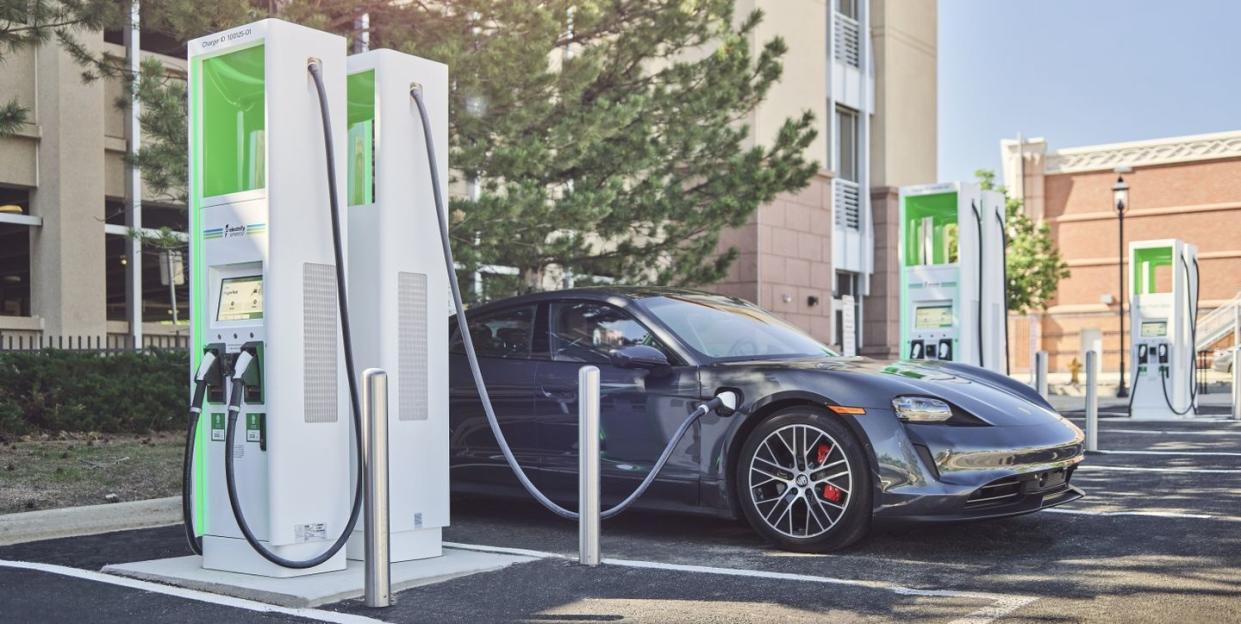New York Will Ban the Sale of Gas-Engined Cars by 2035

A New York state law signed by governor Kathy Hochul sets goal of 100% new passenger car and truck sales in the state being zero-emission vehicles by 2035, similar to executive order issued earlier by California governor.
Newly adopted legislation sets similar goal for medium- and heavy-duty trucks in New York state, but with a target year of 2045.
EV sales in New York state accounted for less than 2% in 2020, pointing to a need for significant gains over the next 13 years.
Following a trend set by a number of countries including Canada, as well as the state of California, New York state has passed a law that sets a target that 100 percent of new passenger cars and trucks sold or leased in the state being zero-emissions vehicles by the year 2035, with the legislation having been signed by Governor Kathy Hochul just a few days ago. The legislation contains a similar goal for off-road vehicles and equipment by 2035. The law also establishes a goal of all medium- and heavy-duty trucks sold or leased in the state being zero-emission vehicles by 2045, "for all operations where feasible."
"New York is implementing the nation's most aggressive plan to reduce the greenhouse gas emissions affecting our climate and to reach our ambitious goals, we must reduce emissions from the transportation sector, currently the largest source of the state's climate pollution," Governor Hochul said in a statement. "The new law and regulation mark a critical milestone in our efforts and will further advance the transition to clean electric vehicles, while helping to reduce emissions in communities that have been overburdened by pollution from cars and trucks for decades."
However, the signed legislation is more akin to a policy statement or executive order, in that it directs a state agency—namely the Department of Environmental Conservation—to propose regulations that will require increased volumes of zero-emission vehicles to be offered for sale with the goal of achieving a 100% mark by 2035. The law effectively compels state agencies to phase out sales of gas- and diesel-engined vehicles and trucks by a certain date through agency rulemaking, which itself has yet to be adopted.
The law as drafted lacks enforcement mechanisms and concrete steps that agencies will need to take in order to phase in sales of zero-emission vehicles. In effect, there are no corresponding state agency rules that have been enacted to proactively promote sales of zero-emission vehicles to such a significant extent, or (perhaps more importantly) actively inhibit sales of internal combustion vehicles at a dealer level. Further legislation and agency rulemaking, complete with enforcement mechanisms, will be needed.
The law also requires that a zero-emission vehicle strategy be developed by 2023, which will then be used by New York State Energy Research and Development Authority (NYSERDA) to create programs and policies to actually promote EV sales.
"Using California's Advanced Clean Trucks Rule as a template, the proposed regulation would require truck manufacturers to transition to clean, electric zero-emission vehicles," the governor's office said in a statement. "Truck manufacturers would be required to meet a certain annual sales percentage of zero-emission trucks, which will vary among vehicle weight classes, beginning with model year 2025. By the 2035 model year, at least 55 percent of all new Class 2b-3 pickup trucks and vans, 75 percent of all new Class 4-8 trucks, and 40 percent of all new Class 7-8 tractors sold in New York State will be zero-emission. The proposed regulation provides medium- and heavy-duty truck manufacturers with several compliance options and would require a one-time reporting from applicable truck fleets."
The statement above, you may have noted, mentions proposed (but not yet adopted) regulations aimed at out-of-state truck manufacturers, rather than sales by truck dealers within the state, while also seeking compliance from reports by specific fleets. These are all three separate variables that are unlikely to stay in complete sync with each other, with the unmentioned fourth one being the types of trucks that will actually be seen in use on New York state roads.
Needless to say, New York state certainly faces some headwinds in achieving 100% zero-emission sales of passenger cars and trucks by 2035, with the BEV share of vehicles in the state hovering around the 1% mark at the moment. So in the next 13 years, EV sales rates in the appropriate vehicle categories would have make significant gains—a tall order, we're sure everyone will agree. Likewise, sales of gas- and diesel-engined vehicles would have to surrender pretty significant market share each year—decisions that are still likely to be dictated by market forces more than anything, absent some very compelling incentives or other types of arm-twisting.
A number of major automakers have rolled out equally ambitious goals for transitioning to an almost EV-only lineup by the end of the decade or a few years thereafter, but even these goals come with plenty of asterisks that rely on myriad factors in order to materialize as predicted. For one thing, assuming comparable levels of annual vehicle sales in the US until 2035, the recovery and processing of raw materials for the production lithium-ion batteries alone would have to experience some very significant growth, absent the sudden arrival of solid-state battery technology that would rely on more easily obtained raw materials. So even the plans of automakers to go EV-only by a certain year are based on other industries being able to keep up with that transition.
Will New York state be able to reach this target by 2035? Let us know in the comments below.


